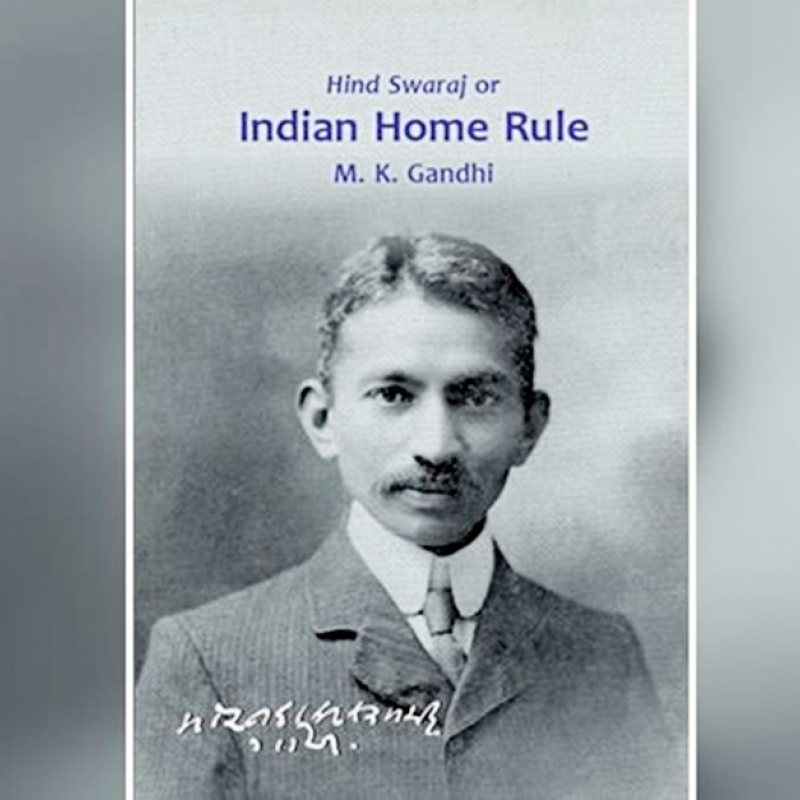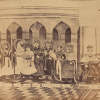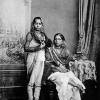Hind Swaraj shows that Mahatma Gandhi's sense of Indian civilisational ethos draws from both the literary canon and oral folklore. Gandhi in this little booklet combines his cultural, political, and economic ideas succinctly.
Mahatma Gandhi's Hind Swaraj and its illuminating civilisational argument in imagining a nation can still enlighten us. Shiv Visvanathan wrote in his Theatres of Democracy, ‘We have to stop reading Hind Swaraj as an eccentricity. It is a manifesto, and it has to be read along with other manifestoes like Rousseau's Discourse on Inequality, Thomas Paine's Rights of Man, and Marx and Engel's The Communist Manifesto. It is as relevant, as important, and as incomplete as any of them. Gandhi's silent message is to tell the reader to write or live out the rest. Each man or woman has to write his or her own Hind Swaraj like U.R. Ananthamurthy did in his last book, Hindutva or Hind Swaraj? or Ela Bhatt has done in her Anubandh.’
Mohandas Karamchand Gandhi wrote the little booklet in 1909—first in his native tongue, Gujarati—while travelling from London to South Africa in a ship. All the imaginative furies that are usually attendant on a writer when one is embarking on creative literature were engulfing him when he was writing Hind Swaraj. He was feverish, sleepless and restless, and he was debating the pros and cons of the ethical principles and practical solutions that would govern a nation that existed only in his imagination. Writing in the form of a dialogue between a reader and an editor, Gandhi readily adopted the genre of Plato's Dialogues and Questions of King Milinda that would lend itself to the accommodation of multiple voices, contemporary and historical information, and perennial values.
Gandhi's central idea in Hind Swaraj emerges from his attack on Western civilisation that values only the acquisition of material wealth at the expense of morality, spiritual and religious values, and the adoption of technology without the concern for the equal distribution of wealth. Gandhi finds that making bodily welfare the object of life, the goal of civilisation, Western society has lost its concern for other values. He argues that even physical well-being is provided only to the wealthy and that Western industrialisation has brought misery to many. He writes, ‘Formerly men worked in the open air only as much as they liked. Now, thousands of workmen meet together and for the sake of maintenance work in factories or mines. Their condition is worse than that of beasts. They are obliged to work, at the risk of their values, at most dangerous occupations, for the sake of millionaires. Formerly, men were made slaves under physical compulsion. Now they are enslaved by temptation of money and of the luxuries that money can buy. There are now diseases of which people never dreamt before, and an army of doctors is engaged in finding out their cures, and so hospitals have increased. This is a test of civilisation.'
Read an excerpt of Hind Swaraj on Google Books here.
What is haunting about the passage quoted above is that Gandhi's critique of Western industrialisation is precisely appropriate for the current argument in support of development that favours big corporate gains, mindless exploitation of natural resources, displacement of the indigenous populace from their original habitats. Critiquing ‘Western industrialisation’ as a hallmark of the ‘Western civilisation’, Gandhi has discovered alternative modes of economy and governance. We see that ideas germane to Gandhian thinking—such as the economically self-sufficient Indian village, elected democratic governance at the panchayat level, and the importance of non-alienated forms of work such as handicraft—are there in Hind Swaraj.
We also see that Gandhi places high importance in 'enoughness', a true civilisational value sanctified in the Indian ethos. Gandhi writes, ‘The more we indulge our passions, the more unbridled they become. Our ancestors, therefore, set a limit to our indulgence.’ The celebrated author of Small is Beautiful, E.F. Schumacher, expressed a similar sentiment when he wrote, ‘An attitude to life which seeks fulfillment in the single-minded pursuit of wealth—in short, materialism—does not fit into this world, because it contains within itself no limiting principle, while the environment in which it is placed is strictly limited.’ Gandhi's idea of limiting the human passions has two other consequences as well; one, it leads to good conduct (he writes, ‘The Gujarati equivalent for civilisation means “good conduct”’) and two, it leads to non-violent behaviour and attitude.
Here is an audio book of Gandhi's Hind Swaraj
Expanding on the Indian civilisational ethos, Gandhi imagines a nation that accommodates a multitude of religions. In a significant passage in Hind Swaraj, he writes, ‘India cannot cease to be one nation because people belonging to different religions live in it. The introduction of foreigners does not necessarily destroy the nation; they merge in it. A country is one nation only when such a condition obtains in it. That country must have a faculty for assimilation. India has ever been such a country. In reality, there are as many religions as there are individuals; but those who are conscious of the spirit of nationality do not interfere with one another's religion. If they do, they are not fit to be considered a nation.’
Hind Swaraj shows that Gandhi's sense of Indian civilisational ethos draws both from the literary canon and oral folklore. Gandhi in this little booklet combines his cultural, political, and economic ideas succinctly.
Around Gandhi Jayanti (October 2), if you are looking for a straightforward summation of Gandhian thought and practice, read Hind Swaraj.
Views expressed are personal.
MORE ON GANDHI IN SAHAPEDIA
Mahatma Gandhi in Chhattisgarh
महात्मा गांधी का प्रथम छत्तीसगढ़ प्रवास
महात्मा गांधी का द्वितीय छत्तीसगढ़ प्रवास
छत्तीसगढ़ में गांधीजी (e-book)
Gandhism and Women in Chhattisgarh
On Archiving and Translating Mahatma Gandhi's Works (Interview with political scientist and cultural historian Dr Tridip Suhrud, Ahmedabad)












